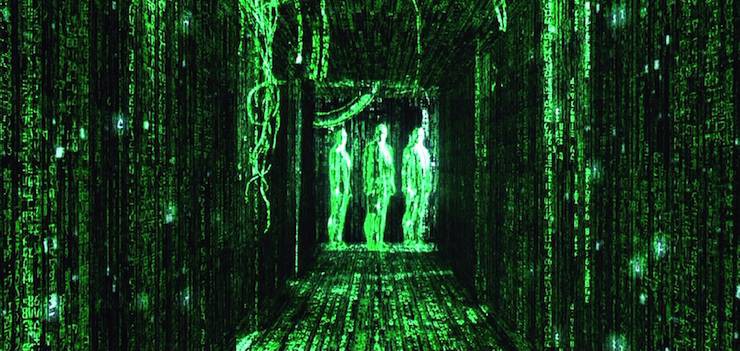Story goes that the Wachowskis approached producer Joel Silver with a script that they wanted to film. Then they showed him the Ghost in the Shell anime, and said “we want to do that, but for real.” He told them that they needed to direct something else first to get the credentials they needed to make their pet project. So the Wachowski’s wrote and directed the movie Bound, which did well enough to approach the studio with The Matrix. Warner Brothers thought their budget for the film was outrageous (around 80 million dollars), so they gave them ten million and told them that was all they would get.
The Wachowskis spent the whole ten million filming the first ten minutes of the script, then came back to Warner Brothers and asked for the rest of their money. They got it.
The Matrix blew up bigger than anyone likely expected, a guiding influence on action movies, science fiction yarns, and special effects to this day. It was one of the biggest movies of 1999, a herald of the genre-saturated blockbusters to come. The film has been the subject of both parody and deep dissection for the better part of two decades, and it’s a film that, for any of its flaws, has aged quite gracefully. It’s a classic man vs. machine myth, complete with cyberpunk panache and anti-establishment fervor.
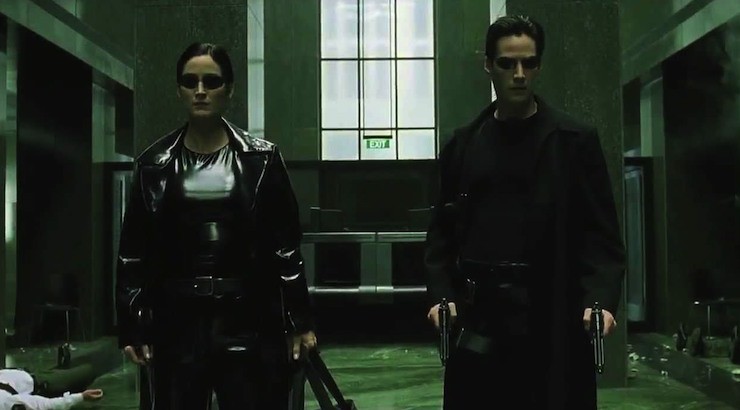
For all that, it is a film that takes its time better than practically any action movie today. The Matrix is a slow burn in practically every sense—not only is our main character Neo something of a vacant tag-along for a good portion of the narrative, but he also spends the first half of the movie forced into asking question after question as he tries to parse out what is happening around him. (Someone did the math and literally 50% of his dialogue in the first half of the film comes in the form of inquiries.)
As a protagonist, I would fervently argue that the best aspect of Neo is how much of a blank slate he remains as a person throughout the story. (Some people like to make fun of Keanu Reeves for his acting in these movies, but his choices seem more intentional than not to me, even if he’s never been the most emotive actor in the world.) And not for the sake of providing a good avatar, or something to that affect. To me, it makes sense that a human who shows such great potential—and later skill—for manipulating the Matrix would have some difficulty communicating on a human level. Interaction is a kind of mystery because he has one foot in the real world, and one in the code, and in this first film he barely understands either world until the very end. It’s such a interesting setup for a hero.
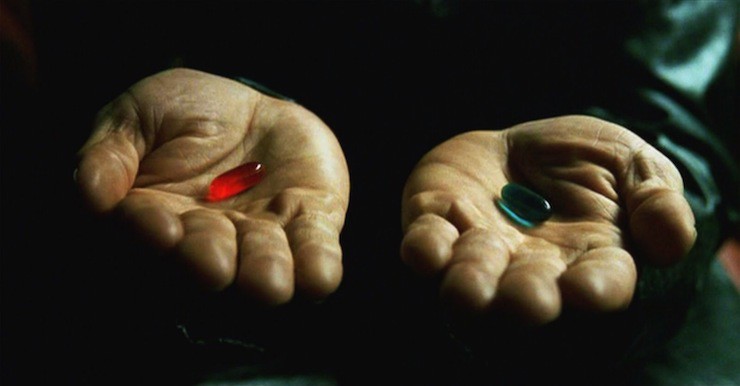
The Matrix is excellent at playing on that innate, niggling paranoia that most people have to some degree or another, and that’s precisely why it’s a hypnotizing yarn in the first place. The concept of control, the concept of fate, the concept of truth, all of these ideas flummox us on a grand scale. The fear that we might not have any say in our own destinies is a powerful one, and the film offered up a perfect slice of that possibility. Watching it the first time as a kid, I remember spending at least a week gripped with existential dread: What if the Matrix were real? Well, it couldn’t be, right? The machines would never want us to put out a film like that and know about them. …Unless they let the movie come out to make us dismiss the idea as fiction. Nooooooo, I live in a pod! Help!
What. I was a preteen with a seriously overactive imagination. I’m definitely not the only one.
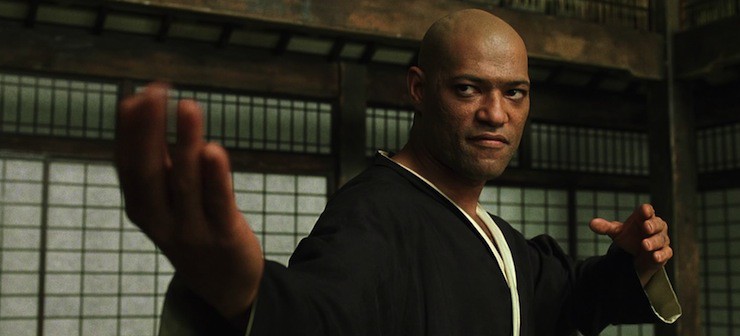
Nevertheless, we are encouraged to engage with the Matrix and with human technology as well, even knowing that it’s “the bad guy.” The ability to learn various skills in minutes via a program is something that every person would likely say yes to, even if it meant having a spike inserted into your head. Despite the dread of how the Matrix uses people, it’s the lie that makes the Matrix dangerous far more than the mere existence of AI itself ever could. On those grounds, the story is purely philosophical, more about seeing through the fog to what’s real, rather than killing the One True Enemy that is technological advancement.
The film’s success was likely baffling to the majority of people who read the script and found it incomprehensible. There are long lists of famous actors who turned down parts in this film because they “just didn’t get the script.” (We got lucky—a lot of the potentials, for practically every role would have resulted in an odd film, to say the least.) Warner Brothers was rumored to agree on that front, which makes The Matrix an excellent lesson in giving audiences a little more credit for comprehension then we’re often given.
Most Wachowski films are unapologetically complex, either in a narrative or conceptual sense. But The Matrix is actually very simple tale: Chosen One must learn skills to defeat evil. Conversely, it is packed with countless references and asides, from books to music to sneaky names, that you have to be paying attention to notice. The Nebuchadnezzar, Morpheus’s ship, is a reference to the eponymous biblical king of Babylon who had a dream he could not remember. Identical twins were used as extras in the film, to give a sense of repetition within the programmed world. Neo hides his black market discs in a copy of “Simulcra and Simulation” by Jean Baudrillard. (The philosopher’s work was required reading for the cast, dealing with the postmodern concepts of simulation, reality, and symbols.) Music playing in the Oracle’s home goes from Django Reinhardt to Duke Ellington. The inscription above her door—translating to “Know Thyself”—are the same words above the entrance of the Oracle at Delphi.
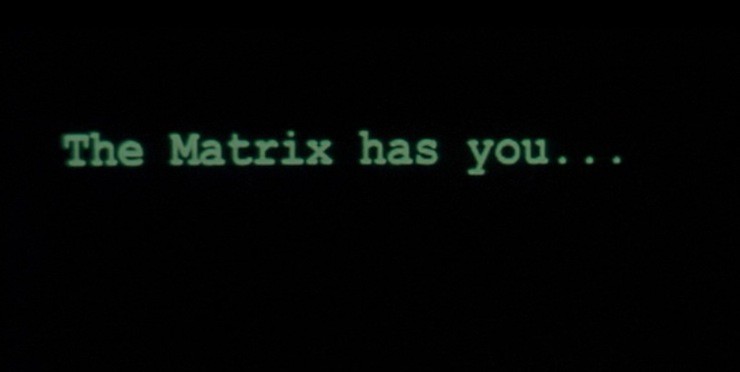
It’s common to zero in on the Christian religious allegory of the film (especially taking the other two movies into account), but that’s honestly doing it a disservice. This universe pays homage to countless myths, legends, and stories from The Odyssey to Alice in Wonderland. It draws from other sci-fi narratives from William Gibson to Philip K. Dick, and beyond. Similar to Star Wars, The Matrix is a super cut of human culture, drawing parallels to and having conversations with well over a dozen more narratives. Combine that with the legendary Woo-Ping Yuen’s fight choreography and some truly innovative special effects, and it’s no wonder the movie holds up.
Among the careful reinterpretations, there have been many fans who have come to think of The Matrix as a perfect allegory for transgender experience. (There is a thorough breakdown of this lens over at The Mary Sue by Marcy Cook, which is wonderfully insightful.) While it seems unlikely that the whole movie was consciously attempting to lay out that metaphor—and the Wachowskis have never given official word on it either way—there are certain aspects of the film that clearly do align with transgender experience, making rewatches even more intriguing and moving than before.
The first, and perhaps most obvious, of these is Agent Smith’s persistent “deadnaming” of Neo as Mr. Anderson throughout the film. (Deadnaming is an act whereby someone refuses to use a transgendered person’s selected name in favor of their birthname/the name that aligns with their previously assigned gender.) Within context of the film, Agent Smith uses Neo’s old name to remind him of his place in the Matrix, refusing to grant him the power he has as Neo, “the One.” But viewing it as a deadnaming grants another layer of emotional bedrock to the narrative: repeatedly calling Neo “Mr. Anderson” is an act of refusing him power, refusing his ability to self-actualize and achieve his destiny.
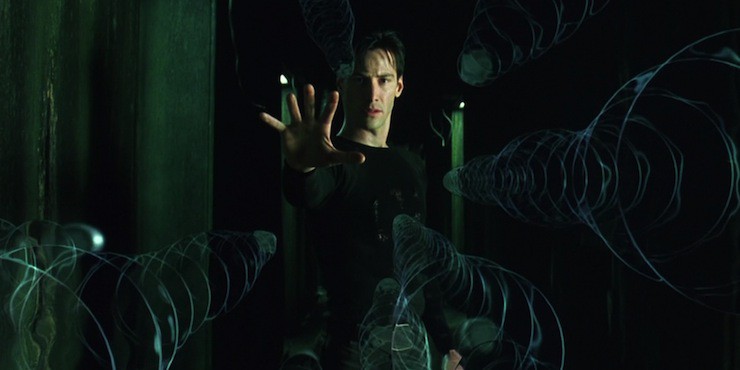
The allegory in that case can’t be denied—particularly in light of the speech Lana Wachowski gave at the 2012 Human Rights Campaign gala, where she discussed a suicide attempt she made as a teenager where she tried to throw herself under a subway train. In the movie’s penultimate fight, Agent Smith tries to detain Neo on subway tracks as a train approaches saying, “You hear that, Mr. Anderson? That is the sound of inevitability. It is the sound of your death. Goodbye, Mr. Anderson.”
And the famous reply comes back: “My name… is Neo.”
With that, Neo is able to flip off the tracks and avoid the train which briefly flattens Agent Smith until their final battle. Knowing Lana Wachowski’s story, this moment gains a completely different resonance. The denial of the deadnaming, the assertion of self, the avoidance of certain death—it all results in a new sheen of affirmation that goes far beyond Neo’s acceptance of his role as The One.
But there’s another little piece of trivia that I think speaks more directly to this reexamination. Remember the character Switch? She was the blonde woman in their crew, one of the group who was killed by Cypher when he betrayed them? It turns out that in the original script, Switch appeared as a woman in the Matrix, and as a man outside in the real world. The intention was to cast two different actors to play the character before Warner Brothers decided it was confusing and nixed the idea. This idea can be read a few ways—because the Matrix is meant to be an system that demands conformity and actively hampers self-knowledge, it could suggest that Switch’s gender identity was withheld from him either by accident or design. (I believe that it’s a common mistake for some fans of these movies to view the Matrix version of a person as their “idealized self,” which does not appear to be the case for most of the characters. Once someone is capable of reentering the Matrix on their own terms, it seems that they can apply a certain amount of mental skill to alter their appearance and more accurately reflect their notion of self, but the version that the Matrix creates for them is their to serve a system that reportedly cares little for ideal scenarios.)
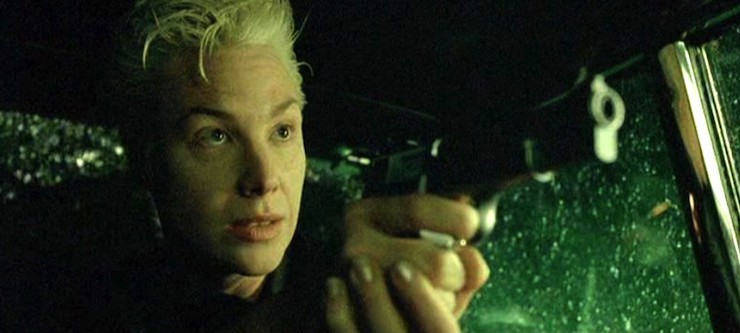
Another possibility is that Switch is a genderfluid or androgynous person, and their identity is flexible enough to account for different bodies in the Matrix and outside of it. And then there’s a possibility that Switch identifies as a woman, and the Matrix enabled her to live as such… until Morpheus gave her a choice, and she took the red pill only to wake up in a completely different body. Pointedly, Morpheus would not have known this when he made the offer.
If this had remained in the script, so many questions would’ve arisen from the character—upon rewatching, I really wish Switch had been portrayed with two actors.
There are a few very clear flaws in the film, to my mind. Passage of time is the most prominent of these; the only way that it is possible to discern how much time has gone by is to observe the dates attached to the phone calls placed at both the beginning and end of the film. According to that, The Matrix takes place over 19 months, or roughly a year and a half. If you didn’t observe these dates, you’d probably assume that the film took place over about a month, and that’s important for so many reasons, leading me to my second issue—the romance appears to occur in about five seconds. If we don’t know that everything is taking place over an extended period of time, then Trinity’s adoration of Neo seems forced and awkward. We don’t get any glimpses of them spending long hours together talking, falling in love aboard the Nebuchadnezzar. Of course, there’s the possibility that Trinity’s love for Neo blossoms due to suggestion via the Oracle. That would actually be an interesting angle to view their romance from. But again, we would need to get some indication of that for it to work.
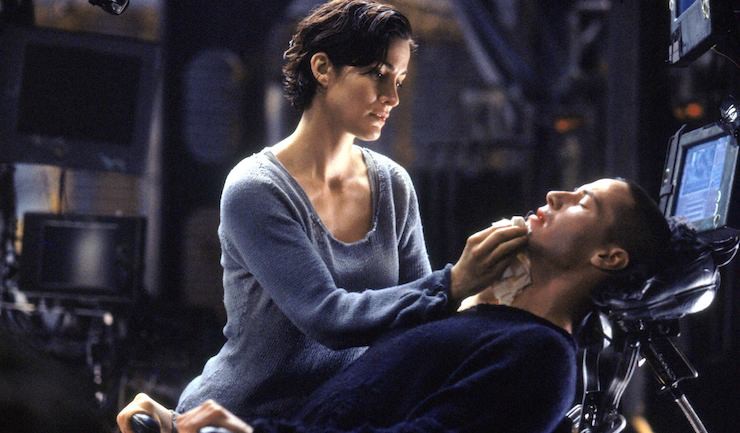
The other little nitpick comes from a morality quibble more than anything; by and large, Wachowski films feature black and white morality. Good guys are good, bad guys are bad, even if they’re interesting. It’s not something I’m always against in film, but it does make Cypher rather boring as the party’s resident traitor. It’s clear that he’s sleazy from the get-go, and the film never suggests that we should feel any pity for him in regretting his choice to take the red pill. And this is more interesting when we take into account that Wachowski’s were interviewed following the film’s release, and asked which pill they would have taken, given the choice… and they both said the blue pill.
But these are mythic characters acting on mythic terms, and even with my desire for a little more depth and ambiguity, the movie is still one of the best science fiction action films the genre has ever seen. The ability to revisit it with consideration toward the Wachowski’s perspectives both now and when they conceived the story also allows for a more rewarding experience all the way around. The Matrix is still thought-provoking, fun, and just plain cool as ever.
Even if I’m secretly scared that I am living in a pod to power artificial intelligences.
Emmet Asher-Perrin still feels a certain amount of visceral horror every time Neo wakes up and gets flushed out of his weird pod. You can bug her on Twitter and Tumblr, and read more of her work here and elsewhere.










